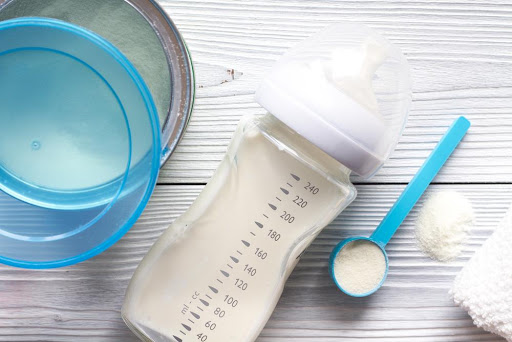If you’re unsure how to choose the best hypoallergenic formula for your child, you’re not alone. Many parents feel confused about which product is best for their child. In this article, we’ll explain what you should look for in a hypoallergenic formula. 
Benefits of Hypoallergenic Formula
Before we go through some important factors to consider when choosing a hypoallergenic formula, you may wonder if it is necessary to buy them compared to regular milk powder. No doubt, baby formula is an essential item but basically, you don’t have to purposely get hypoallergenic milk powder unless your baby is allergic to cow’s milk formula.
This is because babies allergic to cow’s milk protein will find hypoallergenic formula to be a gentler option to their stomach, since hypoallergenic milk formula is made up of protein that is broken down into much tinier molecules, hence they are not as likely to cause allergic reactions compared to the standard cow’s milk formula. The most important factor is whether the formula is made of organic ingredients or contains non-GMO products.
Types of Hypoallergenic Formula
There are a variety of formula that is hypoallergenic in the market, such as:
- Soy-based formulas – milk formula made from soy, may not be 100% hypoallergenic but is one of the popular alternatives to cow’s milk formula. However, it depends on your child – some children may end up developing intolerance to soy apart from cow’s milk protein allergy.
- Partially hydrolyzed formula – Proteins are only partially hydrolyzed in this type of formula. While being grouped as a hypoallergenic formula, it isn’t fully hypoallergenic as this formula may still trigger some allergic reaction in babies with cow’s milk protein allergy or intolerance.
- Fully hydrolyzed formula – The true hypoallergenic option since this formula contains extensively hydrolyzed proteins. Most babies’ allergy problems to cow’s milk can be resolved by consuming this type of formula.
- Amino acid based formula – This formula contains the tiniest protein molecule called amino acids, which are the basic building blocks of proteins, thus making digestion easier for babies with strong allergy or intolerance to cow’s milk. Also known as elemental formula, this formula is considered to be 100% hypoallergenic and is the best hypoallergenic option.
Tips to Choose The Best Hypoallergenic Formula
If your baby has a history of allergies related to cow’s milk consumption, you may want to use a hypoallergenic formula. While they can be more expensive than traditional infant formulas, it’s worth the money to prepare your child for years of healthy growth.
First of all, determine the type of hypoallergenic formula your child needs. You should consult your pediatrician especially if your baby has multiple allergies to help you pinpoint the right type of formula before you go shopping for one.
When you are clear about the type of formula to go for, the next thing to think about is your budget. A hydrolyzed formula can be up to three times more expensive than standard infant formulas. Some companies cover the cost of hypoallergenic formulas which you may check prior to purchase, but it is up to you to find out which ones work best for your child.
Before you buy a formula for your child, consider its ingredients. Most hypoallergenic formulas are free of cow’s milk proteins, but you may still need to make some adjustments. Some milk-based formulas have casein protein, which is an allergen. If your little one’s allergic reaction isn’t a mild one, you may want to avoid using a partially hydrolyzed version of the formula.
While a more expensive brand may be the best option, your baby may not necessarily need that type of formula. Amino acid based formulas are considered to be the best since they are more nutritious for your baby and gentler on their stomachs, but they are more expensive than hydrolyzed formulas and the other alternatives. Unless your baby has severe allergies, you don’t have to force yourself to purchase the most expensive option.
Because hypoallergenic formulas are more expensive than traditional ones, you may want to try several brands before settling on a particular one. Try to get samples of hypoallergenic formula so that you can check if your baby tolerates the milk powder well or if your baby rejects the taste. It may take several tries before you settle on the best hypoallergenic formula.
In some cases, a child may not respond well to a particular brand. Some babies find the taste of hydrolyzed formulas or soy-based formula unappealing. Hence, some brands even add sugar to make it more appealing, so you may notice the formula contains corn syrup solids. Remember to go over the ingredients list to ensure your hypoallergenic formula does not contain unnecessary additives.
Conclusion
While hypoallergenic formulas are typically more expensive than traditional infant formulas, they can help alleviate many problems. For the best results, try talking to your doctor to determine what’s the best choice. Your doctor will most likely have samples of a variety of formulas for you to try. If you can’t find one that’s right for your child, search for trial sizes or small packages of different products.
Different children react differently to each hypoallergenic formula, so it may take time to finally find one that works best for your baby in terms of acceptance and reducing the allergy episodes. Hope these tips help, and all the best with your search!
More tips on formula-feeding
- Psychology of formula feeding & all the pros and cons
- How to Choose the Best Hypoallergenic Formula For Your Child
- Feeding formula and the best formula for sensitive breastfed babies
- Top 5 Best Baby Formulas for Newborns
- What Are The Benefits Of Infant Formula For Babies
- Where To Buy Trusted Baby Formula Online